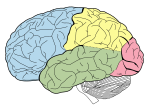Affective memory was an early element of Stanislavski's 'system'. It was adopted by Lee Strasberg and made a central part of his own acting technique 'The...
2 KB (199 words) - 21:34, 13 March 2024
emotion, feeling, mood, emotional state, sentiment, affective state, emotional response, affective reactivity, disposition. Researchers and psychologists...
53 KB (6,511 words) - 04:07, 25 June 2024
learning and testing environments prevent memory retrieval impairment following stress". Cognitive, Affective & Behavioral Neuroscience. 9 (3): 229–36...
128 KB (16,049 words) - 11:13, 2 September 2024
and techniques of Method acting are substitution, "as if", sense memory, affective memory, and animal work (all of which were first developed by Stanislavski)...
33 KB (4,253 words) - 02:57, 7 September 2024
findings in which students in negative affective states had improved lie detection compared to students in positive affective states. In a study, students watched...
37 KB (4,599 words) - 20:53, 30 April 2024
emotions are remains an issue of debate within the field of affective neuroscience. The term "affective neuroscience" was coined by neuroscientist Jaak Panksepp...
81 KB (9,256 words) - 11:31, 1 September 2024
influence that affect has on cognitive functioning. It has been proposed that affect has two major dimensions, namely affective valence and affective arousal...
20 KB (2,492 words) - 09:13, 30 March 2023
Affective memory Amygdala Arousal Dispositional affect Effects of stress on memory Emotions in decision making Flashbulb memory Law of effect Memory and...
60 KB (7,072 words) - 03:47, 1 August 2024
approach differed markedly in that he completely abandoned the use of affective memory, a distinct characteristic of method acting. Meisner maintained an...
22 KB (2,453 words) - 18:50, 5 September 2024
Amnesia (redirect from Memory loss)
memory caused by brain damage or brain diseases, but it can also be temporarily caused by the use of various sedative and hypnotic drugs. The memory can...
54 KB (6,821 words) - 13:55, 11 September 2024




